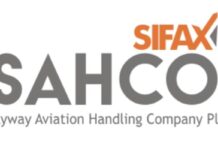The senate committee on aviation yesterday expressed concern about the poor financial state of the country’s domestic airlines and the danger it poses to aviation safety.
Addressing journalists in Abuja, chairman of the committee and representative of Kogi West senatorial district, Mr. Smart Adeyemi stated that the absence of sustainable palliatives from government as obtained in other climes had forced the airline operators to cut corners to maintain aircraft.
He said the N4 billion bailout for the domestic carriers is inadequate and therefore appealed to the federal government to review the intervention fund.
“In most nations, there are special palliatives for airline operators because they must not compromise.
“If the part is needed in three weeks, and it is not available and the operators decide to be managing, well you know what will happen.
“I want to put it on record that there is danger in flying in Nigeria today. There are instances of some planes skidding off the runway.
“We must support the airline operators pending when we have our own national carrier. But if we want to continue with the operators like most nations are doing today, we cannot afford to leave them on their own, because they will want to be in business and struggle to make profit, and by extension, there will be cutting of corners,” he said.
He said the country’s airline’s sub-sector is in a critical situation and called for immediate implementation of executive orders mandating the Nigeria Customs Service to waive taxes on imported spare parts and commercial airlines.
Adeyemi said Nigerian airlines have been hampered by “the inability of airline operators to have access to single digit lending as obtained in other parts of the world.”
“The absence of foreign exchange as and at when due to enable operators pay value added taxes for their aircraft is another obstacle to the smooth operations of the industry,” he added.
The lawmaker said the aviation industry needs about N50 billion pointing out that Senegal and Rwanda have earmarked $74 million and $150 million respectively to bail out their airlines.




























































